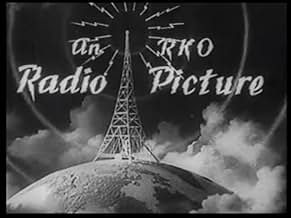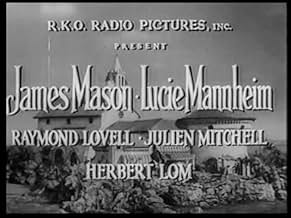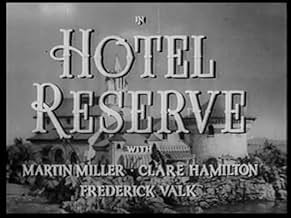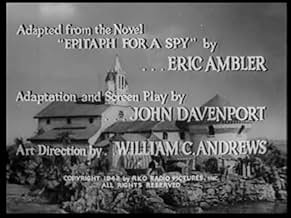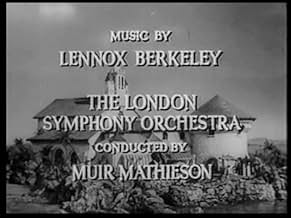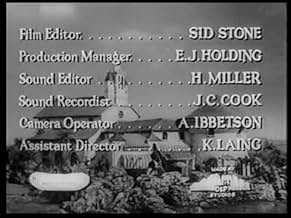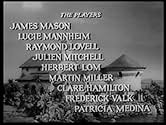AVALIAÇÃO DA IMDb
6,2/10
960
SUA AVALIAÇÃO
Adicionar um enredo no seu idiomaA hunt for a spy, in an hotel in the South of France just before World War Two.A hunt for a spy, in an hotel in the South of France just before World War Two.A hunt for a spy, in an hotel in the South of France just before World War Two.
- Direção
- Roteiristas
- Artistas
Joseph Almas
- Albert, the waiter
- (as Josef Almas)
Hella Kürty
- Hilda Vogel
- (as Hella Kurty)
- Direção
- Roteiristas
- Elenco e equipe completos
- Produção, bilheteria e muito mais no IMDbPro
Avaliações em destaque
JAMES MASON finds himself in a very Alfred Hitchcock situation in HOTEL RESERVE, that of an innocent man suspected of being a spy and having to prove his innocence by cooperating with the authorities to nab the real espionage agent. Sound familiar? Hitchcock used the same sort of innocent man frame-up in many films, most notably NORTH BY NORTHWEST.
But what's missing here, as others have commented, is that Hitch's expert touch is missing from the direction. The plot even has an exciting ending where hero and villain are atop a tall building and we know which one is going to meet his demise--but it's rather well done, except that Hitchcock would have thrown in some added touches for an even tighter bit of suspense.
Mason is very good in the leading role as the man caught in what appears to be a trap, while staying at the Hotel Reserve, where he must survey all the other guests to determine which one may have gotten their hands on his camera by mistake. The plot never becomes too overburdened with subplots (as some of these thrillers do), so it's all told in a brief hour and nineteen minutes.
HERBERT LOM is effectively cast as the hot-headed villain, with PATRICIA MEDINA not having much to do as his docile wife, and LUCIE MANNHEIM makes almost no impression at all as Mason's love interest, providing little more than a pretty face and a blank stare.
The improbable entrapment of the killer by police is a minor quibble, as is his method of temporary escape--but other than that, it's an acceptable spy thriller.
Summing up: Taut and tense with occasional bits of humor, it establishes why James Mason became a favorite with British and American audiences.
But what's missing here, as others have commented, is that Hitch's expert touch is missing from the direction. The plot even has an exciting ending where hero and villain are atop a tall building and we know which one is going to meet his demise--but it's rather well done, except that Hitchcock would have thrown in some added touches for an even tighter bit of suspense.
Mason is very good in the leading role as the man caught in what appears to be a trap, while staying at the Hotel Reserve, where he must survey all the other guests to determine which one may have gotten their hands on his camera by mistake. The plot never becomes too overburdened with subplots (as some of these thrillers do), so it's all told in a brief hour and nineteen minutes.
HERBERT LOM is effectively cast as the hot-headed villain, with PATRICIA MEDINA not having much to do as his docile wife, and LUCIE MANNHEIM makes almost no impression at all as Mason's love interest, providing little more than a pretty face and a blank stare.
The improbable entrapment of the killer by police is a minor quibble, as is his method of temporary escape--but other than that, it's an acceptable spy thriller.
Summing up: Taut and tense with occasional bits of humor, it establishes why James Mason became a favorite with British and American audiences.
Propaganda plays a key role in modern warfare, so between 1939 and 1945 the British cinema made an important contribution towards our war effort. Although "Hotel Reserve" is set during the pre-war period, it can nevertheless be regarded as a propaganda film as it is a spy thriller in which the Nazis are the villains and the good guys, apart from the French intelligence services, are Austrian and German anti-Nazi émigrés.
In the summer of 1938 Peter Vadassy, a young Austrian medical student studying in France, is on holiday at the Hotel Reserve in the south of France. Being a keen photographer, he takes a number of photographs and then takes the negatives to the local pharmacy to have them developed. When he tries to collect the prints, however, he is arrested by French intelligence. It turns out that some of the photographs are of the French naval base at Toulon. Michel Beguin, the intelligence officer who interrogates Peter, realises that he is not a spy, but nevertheless sends him back to the hotel with instructions to find the real culprit, under threat of expulsion from France. This would mean Peter's having to abandon his medical studies and, as he is opposed to the Nazi regime, has no desire to return to Austria. (Contrary to what is argued in the "goofs" section, the year must be 1938, not 1937).
As others have pointed out, the plot of "Hotel Reserve"- an innocent man caught up in international espionage- could be that of an Alfred Hitchcock film. It was one he used in, among others, the two versions of "The Man who Knew Too Much" and "North by North-West". (James Mason, who appears as Peter here, also appeared in "North by North-West", his only collaboration with Hitchcock, although in that case as the film's villain rather than its hero). By 1944, however, Hitch had left Britain for Hollywood, so was not available. The film was both directed and produced by a trio: Lance Comfort, Mutz Greenbaum (aka Max Greene) and Victor Hanbury.
It is interesting to speculate what the film might have looked like had Hitchcock directed it. There would probably have been a more prominent leading role for Peter's love-interest Mary, who would doubtless have been played by a blonde. Hitch would also probably have maintained a greater level of suspense throughout; in the film as it exists the tension tends to slacken in the middle, although there is a very tense (and very Hitchcockian) final scene involving a rooftop cliff-hanger. This is a decent, but not outstanding, spy thriller, and mason made many better films in his long and distinguished career, but in 1944 it was doubtless appreciated. 6/10.
In the summer of 1938 Peter Vadassy, a young Austrian medical student studying in France, is on holiday at the Hotel Reserve in the south of France. Being a keen photographer, he takes a number of photographs and then takes the negatives to the local pharmacy to have them developed. When he tries to collect the prints, however, he is arrested by French intelligence. It turns out that some of the photographs are of the French naval base at Toulon. Michel Beguin, the intelligence officer who interrogates Peter, realises that he is not a spy, but nevertheless sends him back to the hotel with instructions to find the real culprit, under threat of expulsion from France. This would mean Peter's having to abandon his medical studies and, as he is opposed to the Nazi regime, has no desire to return to Austria. (Contrary to what is argued in the "goofs" section, the year must be 1938, not 1937).
As others have pointed out, the plot of "Hotel Reserve"- an innocent man caught up in international espionage- could be that of an Alfred Hitchcock film. It was one he used in, among others, the two versions of "The Man who Knew Too Much" and "North by North-West". (James Mason, who appears as Peter here, also appeared in "North by North-West", his only collaboration with Hitchcock, although in that case as the film's villain rather than its hero). By 1944, however, Hitch had left Britain for Hollywood, so was not available. The film was both directed and produced by a trio: Lance Comfort, Mutz Greenbaum (aka Max Greene) and Victor Hanbury.
It is interesting to speculate what the film might have looked like had Hitchcock directed it. There would probably have been a more prominent leading role for Peter's love-interest Mary, who would doubtless have been played by a blonde. Hitch would also probably have maintained a greater level of suspense throughout; in the film as it exists the tension tends to slacken in the middle, although there is a very tense (and very Hitchcockian) final scene involving a rooftop cliff-hanger. This is a decent, but not outstanding, spy thriller, and mason made many better films in his long and distinguished career, but in 1944 it was doubtless appreciated. 6/10.
A young James Mason does a fine job in this film. The story is set a few years before the start of WW II. Mason is a guest at a quiet resort hotel in France. His camera is accidentally used by a German spy who has an identical one. When Mason takes a roll of film to be developed, the roll contains several pictures of top secret French aircraft and facilities. The police question Mason and are able to determine that he is innocent in the matter. But, they use the charges against him as leverage to get him to assist them in finding out which of the other hotel guests is the spy. How he succeeds makes for a most interesting and tension filled story.
I enjoyed this. It had an interesting plot, and yes, Hitchcock would probably have beefed it up and done it better, and some of the characters are clichés, but not a bad way to spend a rainy afternoon.
For a film over 75 years old it has stood the test of time quite well. It was a far better viewing experience than many current films I have watched recently.
For a film over 75 years old it has stood the test of time quite well. It was a far better viewing experience than many current films I have watched recently.
Idylls before the war turn into a nest of wasps and intrigue. James Mason is the innocent medical student on a vacation from his studies in Paris, who gets his camera 'borrowed' by someone who takes some forbidden pictures of the French navy at Toulon - just before the war. Naturally James Mason gets implicated for the heinous crime with prison, expulsion and perhaps execution to look forward to as a sudden interruption of his medical career, which was not what he had expected of his holiday in Provence by the delightful Mediterranean with some lovely young ladies around at the ideal hotel. Among the guests are a German citizen from Berlin who proves himself to be a direct victim of the Gestapo, a fugitive from Prague and a former social-democrat journalist with nothing good to expect from his Gestapo pursuers, and he is the tragedy of the case. The hotel and its environment is very much like in the comedy "French Without Tears", it's the same atmosphere and the same idyllic charm, which is brutally contrasted by sinister proceedings. Several of the guests are great comedians. James Mason makes the best of a precarious predicament, sometimes loses his temper at the risk of his life, and he is absurdly compromised, but that is all part of the game. The French police know what they are doing, and the only thing missing here is Hercule Poirot.
Você sabia?
- CuriosidadesClare Hamilton, who plays Mary Skelton, was the sister of Maureen O' Hara. This would be her one and only screen appearance.
- Erros de gravaçãoAll online summaries of the plot identify the year being 1938, but days and dates seen on the calendar in Peter's room are only correct if the year is 1937. Whoever wrote the original synopses for this film apparently knows no French.
- Citações
[last lines]
Mme Suzanne Koch: Let them be happy, while they can. There are so few summers. There's so little time.
- Cenas durante ou pós-créditosOpening credits prologue: A holiday...in France...before the war...yet even then the plane-trees and cypresses of the South cast shadows in the sun.
It happened in August 1938 ...
- ConexõesRemade as Epitaph for a Spy (1953)
Principais escolhas
Faça login para avaliar e ver a lista de recomendações personalizadas
Detalhes
- Data de lançamento
- País de origem
- Idioma
- Também conhecido como
- El espía del hotel
- Locações de filme
- Empresa de produção
- Consulte mais créditos da empresa na IMDbPro
- Tempo de duração1 hora 30 minutos
- Cor
- Proporção
- 1.37 : 1
Contribua para esta página
Sugerir uma alteração ou adicionar conteúdo ausente

Principal brecha
By what name was Hotel Reservado (1944) officially released in India in English?
Responda
